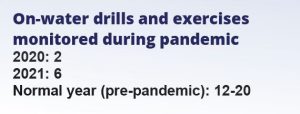The Council has released its annual report on drills and exercises conducted in Prince William Sound in 2021. This report highlights the continuing effects of the COVID-19 pandemic and lessons learned.
Reduced on-water monitoring for second year
 For the second year in a row, the Council has been unable to monitor the on-water drills and exercises in Prince William Sound as closely as pre-pandemic years.
For the second year in a row, the Council has been unable to monitor the on-water drills and exercises in Prince William Sound as closely as pre-pandemic years.
The Council has not been allowed on tugs or barges since early 2020, given COVID safety precautions. To be able to monitor some drills, the Council has chartered boats to observe from afar, but evaluation has proved difficult from such a distance.
“We can’t see the full evolution of the exercise or hear communications,” says Council drill monitor Roy Robertson. “We can’t tell if the crews are having problems deploying boom and we can’t time the activities like we usually do.”
A quick response is critical to prevent spills. State regulations require certain tasks like boom deployment be done within a specified time limit. These drills and exercises are good practice for responders and help to ensure that crews will be ready to respond efficiently if a spill were to occur.
At a recent Council meeting, Alyeska stated that they hope to start allowing observers back onboard their tugs and barges to evaluate drills and exercises in the near future.
First virtual drill for Prince William Sound
While activities like boom deployment must be done in person and on the water, tabletop exercises can be performed virtually.
The Prince William Sound shipping companies take turns holding an annual drill to test these activities. Usually, this takes place in the Valdez Emergency Operations Center, which can get crowded.
This year, Polar Tankers and ConocoPhilips conducted the first-ever virtual drill in Prince William Sound. Folks participated from as far away as London. Most were participating online, which reduced the number of people in the emergency operations center.
Council staff monitored the online meetings.
“This drill showed that a spill response can be managed remotely,” Robertson said. “It’s possible to do, but maybe not recommended as best practice because in-person drills facilitate relationship-building.” Relationships that can be leveraged during actual spills in the future.
A few technology issues arose. Robertson said time stamps on documents were confusing because participants were tuning in from different time zones.
First exercise involving a foreign tanker
Another first this year occurred in June. The Los Angeles Spirit, a foreign flagged tanker chartered by Hilcorp and operated by Teekay Shipping, participated in a towing exercise.
The Council has advocated for years for foreign flagged tankers to take part in drills and exercises. Since 2016, more foreign tankers have been loading oil from the terminal.
These crews may be unfamiliar with the harsh Alaska weather or the prevention and response systems that protect our unique region. The Council is concerned this may increase risk of an accident or oil spill.
During the exercise, the crews of the tanker and escort tugs went through the steps it would take for the tugs to take control of the tanker and begin towing. During the first part of this process, the tanker’s captain is in charge, giving orders and instructions to the tugs on how and when to approach the tanker and connect a towline.
Once the towline is connected, the captain of the towing tug takes over control. The tanker is then taken in tow like a barge.
Clear communication is important during these operations. Robertson said the tanker’s captain and crew performed well.
The Council looks forward to future exercises with foreign flagged tankers.
2021 Drill Report
Full descriptions of the drills and exercises described above:
2021 Annual Drill Monitoring Report
Tracking lessons over time
Each year, the Council issues an annual summary of activities and observations from the previous year. These reports help the Council track the history of spill preparedness and response by Alyeska’s Ship Escort/Response Vessel System and the associated shippers.